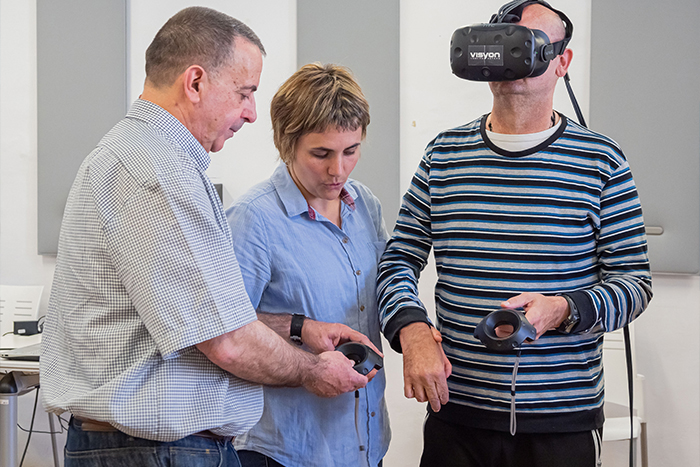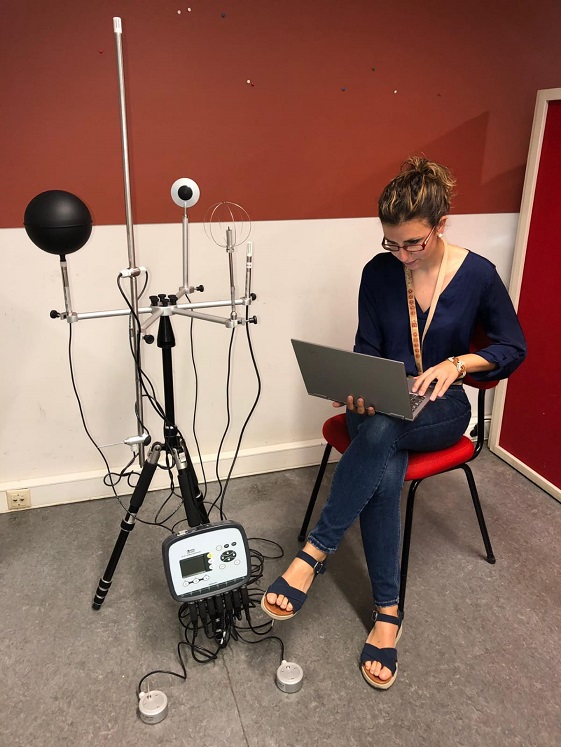
STAT-ON, a new device to monitor motor symptoms of Parkinson’s disease
June 21, 2019
Virtual reality for people who have had a stroke
September 6, 2019A group of researchers from the Group of Construction Research and Innovation (GRIC) are leading a research project to determine suitable environmental parameters for elderly people and establish which are the optimum thermal conditions for this group.

Although thermal comfort is a determining factor for elderly people’s quality of life, currently there are no state or International laws that define this indicator. The process of biological ageing and circulation problems reduce the capacity to regulate body temperature. This causes a reduction in thermal sensation.
The Group of Construction Research and Innovation (GRIC) has launched a project that will determine objectively for the first time the parameters that influence the thermal comfort of elderly people. The data obtained will enable the development of a statistical model that will serve to define the setpoint temperatures of spaces in care centres for elderly people, according to outside climate conditions.
To obtain these data, surveys will be administered to 6,000 residents and 500 professionals at various Sanitas Mayores centres in Barcelona, Tarragona and Valencia. The survey will be administered during workshops that the residents attend regularly, in collaboration with the occupational therapists at the same centres. The questions will be direct and easy to understand and will refer to temperature perception at the precise time and place where the person is, to avoid potential bias in the responses due to any type of cognitive deterioration.
Thermal sensation; result of several indicators
To determine the thermal sensation objectively, the indoor and outdoor environmental conditions will be monitored over a year in spaces in each of the buildings under study. To achieve this, temperature and relative humidity sensors will be used within and outside the building as well as an air speed sensor inside, and a globe thermometer to provide information about the heat absorbed and emitted by all the elements in the room, such as furniture, walls, windows and even the people themselves.
Aspects such as the weight, height, body mass index, clothes or activity undertaken by people affect their thermal sensation. The analysis of this information, together with the data gathered from the sensors and the surveys, will lead to the development of the first statistical model of thermal comfort specifically for the elderly.
To assess the influence of climate on thermal comfort, the results shall be compared with those obtained by the Instituto de Saúde Pública da Universidade do Porto (ISPUP), which will analyse other residential centres for elderly people in the metropolitan area of the Portuguese city.
The project is developed jointly with ‘Sanitas Mayores’ and funded with 100,000 euros by the Fundació General CSIC, European Interregional Cooperation - Interreg and the International Centre on Aging (CENIE).

Technology
You want to know more?
Related Projects
- A team from the Bioinspired Oral Biomaterials and Interfaces (BOBI) research group at the Department of Materials Science and Engineering (CEM) of the Universitat Politècnica de Catalunya - BarcelonaTech (UPC) is taking part in the European project HYDROHEAL, which explores how to transform bone fracture treatment using smart and advanced biomaterials, aiming to reduce the risk of infection and implant rejection, as well as shortening fracture recovery times.
- Neurodegenerative diseases, such as Parkinson's disease, Alzheimer's, and age-related disorders, have been widely studied due to their significant impact on individuals and society. So far, these are incurable and debilitating diseases that lead to progressive degeneration and death of nerve cells, resulting in cognitive and mobility impairments. Tremors, mainly at rest, slowness of movement (bradykinesia), limb rigidity, and issues with gait and balance are typical motor disorders related to Parkinson’s disease. Additionally, due to progressive muscle atrophy, these issues can lead to falls, which in turn result in further complications and risks to quality of life.
- The Biomaterials, Biomechanics, and Tissue Engineering (BBT) Research Group at the Institute for Health Research and Innovation (IRIS) of the Universitat Politècnica de Catalunya – BarcelonaTech (UPC) is leading DYNAMIC, a project aimed at creating multifunctional, stimuli-responsive biomaterials that not only promote bone regeneration but also intelligently and effectively combat bacterial infections.
- 30/09/2024Project Headerrightno-repeat;left top;;auto20px A team from the Centre for Research in Biomedical Engineering (CREB) of the UPC and Sant Joan de Déu has created a new […]




